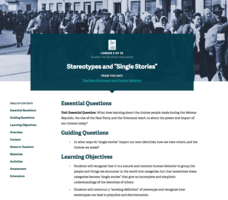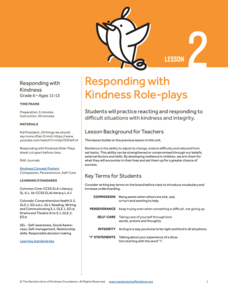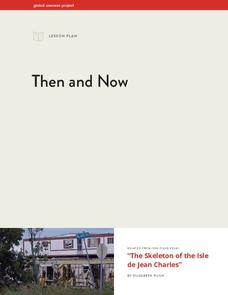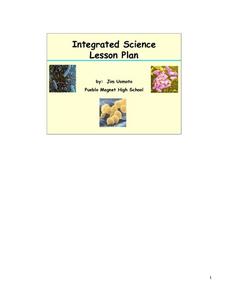Curated OER
Creating Nonviolence: A Theatre of the Oppressed Approach to Things Fall Apart
Eleventh graders analyze Ahimsa and complete activities for nonviolence. For this nonviolence lesson, 11th graders define violence and relate it to their lives. Students adapt prose into a dialogue to act out and analyze the violence in...
Curated OER
Classification of Living Things
Pupils classify organisms according to the rules of taxonomy. In this biology lesson plan, students name organisms using binomial nomenclature. They create a new organism and explain which specific group it belongs to and why.
Curated OER
GDP and Standard of Living
Seventh graders discuss the GDP and Middle Eastern nations. In this standard of living lesson, 7th graders complete a worksheet during a lecture on the GDP. Students identify the impact of the GDP on a country and reasons for wanting to...
Curated OER
Lunch
First graders view and sort a display of fruits and vegetables by one characteristic. They listen as the teacher reads the story, "Lunch." Students identify items on the pages as living or nonliving, fruit or vegetable. Using magazines,...
Science Matters
Oh Heron
Two teams—the environmentalists and herons—play four rounds of the game, Oh Heron. Using hand symbols to represent food, shelter, and water, players locate their match to produce more herons while those unmatched decompose.
Science Matters
Blubber Gloves: It’s All About Insulation
Instill the concept of adaptation with the help of Blubber Gloves—ziplock bags, shortening, and duct tape. Scholars discuss how animals and plants keep warm in polar regions, record their predictions, and try on their Blubber Gloves to...
Huntington Library
Everyday Life - Exploring the California Missions
Young scholars relive history as they examine primary sources that document everyday life in the California missions. During a class viewing of the included slideshow presentation, children analyze documents, paintings, and drawings in...
Equality and Human Rights Commission
Taking Action
The Universal Declaration of Human Rights passed in 1948 when the majority of members of the United Nations voted in favor of the resolution. Scholars use their knowledge of human rights to determine ways they personally can help promote...
American Museum of Natural History
Create Your Own Time Capsule
The corona virus pandemic is indeed a historic event. A time capsule activity permits young historians to document these days of social distancing, remote learning, and quarantine by collecting artifacts that capture what their lives are...
Ohio National Guard
Emotional Intelligence
Provide teenagers with the social skills they need to live happy lives with this collection of worksheets and activities. Covering a variety of topics from self-awareness and assertiveness, to stress management and problem solving, this...
Facing History and Ourselves
Stereotypes and “Single Stories”
Help bring subconscious stereotypes to the surface to stop it in its tracks. Pupils first read an excerpt describing the experience of prejudice and analyze how this process connects to World War II. Then, they write a creative story...
English Worksheets Land
Penny and Her Dad
A divorce can seem like everything's changing, but some things do stay the same. Read a passage about Penny and her parents, comparing and contrasting the ways her parents' houses are the same and are different.
Roald Dahl
Matilda - The Reader of Books
The titular Matilda from Roald Dahl's famous novel adored books above all things. Discuss why it is important to read stories from across cultures and around the world using the first chapter from the ever-loved story Matilda.
Pearson
Past Time
How do you talk about things that have already happened? What about things that happened in the past and are still happening? Explore past, past perfect, and past progressive verb tenses in a helpful slideshow presentation.
Random Acts of Kindness Foundation
Responding with Kindness Role-plays
Thank you. Excuse me. I'm sorry! Pupils watch a video about encouraging things people should say more often. Next, they work in small groups to develop a role-play based on a difficult situation. They perform their role-plays for the...
Global Oneness Project
Then and Now
The devastating changes happening to the Native American inhabitants of an island off the coast of Louisiana are the topic of an informational lesson. After scholars break into groups to explore particular topics, they come back together...
US National Archives
The Home Front: How Did People Prepare for the War at Home?
Wars have a profound effect not only on a country's soldiers, but also on the everyday lives of its citizens. Invite young historians to discover how Britain prepared for the second World War by analyzing a series of government posters...
Safe Teens
Teen Game Plan
Don't let the teenagers in your class begin their life without a plan. A brief but inclusive booklet takes high schoolers thorough various aspects of their lives, including financial literacy, vaccinations, and sexual health, and lets...
Sunburst Visual Media
Respect: It Starts With You!
There are few things as frustrating to a teacher as a disrespectful student. Luckily this collection of activities, worksheets, and writing exercises is here to help eliminate this problem by teaching young leaners what respect really...
IREM
Conflict Management Styles Assessment
How do you prefer to handle conflict? And what does your approach say about you? Although not a validated, or scientific instrument, this assessment is sure to generate lively discussion.
Civil War Trust
Civil War Personalities Lesson Plan
Caring, trustworthiness, and responsibility—these are only a few character traits in focus of a lesson based on stories from the Civil War era. Class members explore several influential lives while reading biographies that highlight...
K5 Learning
One of Aesop's Fables
It's one thing to have an idea, but someone has to put it into action! Young pupils read a rendition of Aesop's fable of the mice in the council before answering four questions about details from the text.
Curated OER
Scientific Method Unit: Bacteria
Young scholars discover how to apply the steps of the inquiry process through the study of bacteria. Working in groups of four, they cooperatively read an article about bacteria and complete a graphic organizer. Group members share with...
Curated OER
Are You Balanced?
Fifth graders discuss what it means to have balance in their lives. Individually, they are given a worksheet in which they list their activities and things they are involved in. To end the lesson, they place weights on each side of a...

























